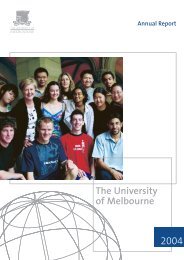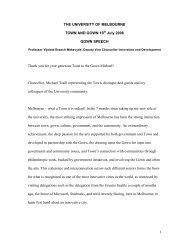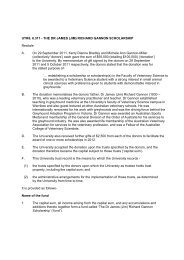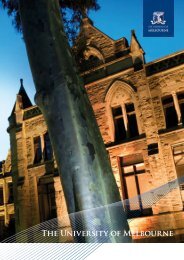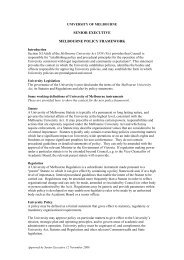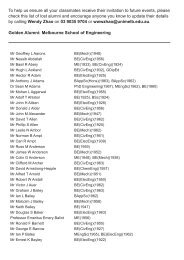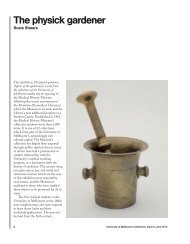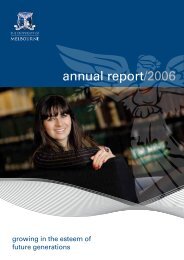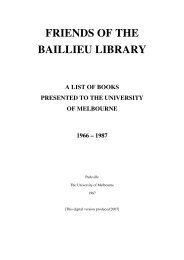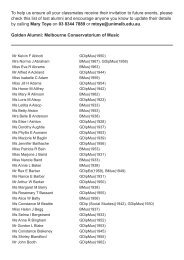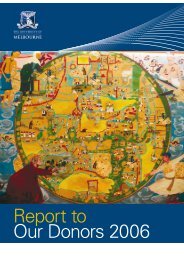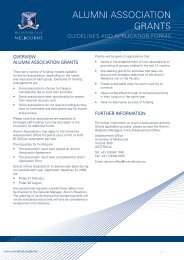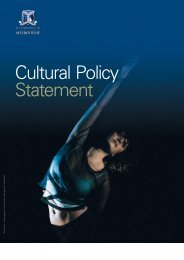2010 International Undergraduate Prospectus nts. u.au
2010 International Undergraduate Prospectus nts. u.au
2010 International Undergraduate Prospectus nts. u.au
You also want an ePaper? Increase the reach of your titles
YUMPU automatically turns print PDFs into web optimized ePapers that Google loves.
86<br />
In the first year stude<strong>nts</strong> study: Counselling<br />
Skills, Health Communication Skills 1,<br />
Research Methodology, Human Genetics<br />
and Genetic Counselling, Genetic<br />
Counselling in the Community, Health<br />
Communication Skills 2 and Clinical<br />
Genetics. In the second year stude<strong>nts</strong><br />
study: Clinical Practice, Genetic Counselling<br />
Practice and research.<br />
Creating a world of career<br />
opportunities<br />
Genetic counsellors work in<br />
multidisciplinary teams with clinical<br />
geneticists, nurses, social workers and<br />
dieticians, communicating complex genetic<br />
information to individuals and families<br />
to facilitate decision-making. Genetic<br />
counsellors are employed in clinical<br />
genetics units and work in many areas<br />
including: cancer genetics, predictive<br />
testing, paediatric genetics, prenatal<br />
genetics, and adult genetics. Genetic<br />
counsellors increasingly are involved in<br />
qualitative and quantitative clinical genetic<br />
research.<br />
<strong>International</strong>ly, genetic counselling is t<strong>au</strong>ght<br />
as a two-year clinical Master’s program. The<br />
University of Melbourne’s Master of Genetic<br />
Counselling aims to increase research and<br />
employment opportunities for graduates by<br />
developing reciprocity with other countries.<br />
The University’s well established links<br />
to overseas training programs provide<br />
international opportunities for stude<strong>nts</strong>,<br />
through an active exchange program<br />
for clinical placeme<strong>nts</strong> and research<br />
collaborations. Past graduates are<br />
employed throughout the world including<br />
Singapore, Malaysia, New Zealand.<br />
Professional and international<br />
degree recognition<br />
The Master of Genetic Counselling satisfies<br />
the requireme<strong>nts</strong> for Part 1 certification<br />
through the Board of Censors in Genetic<br />
Counselling (Human Genetics Society<br />
of Australasia) and is the prerequisite for<br />
obtaining employment in the field of genetic<br />
counselling in Australia, New Zealand<br />
and South-east Asia. It is expected that<br />
graduates of the Melbourne Masters will<br />
be eligible to register to practise as genetic<br />
counsellors in the United Kingdom and<br />
Canada, further increasing employment<br />
opportunities.<br />
Master of Information Systems<br />
Duration and campus<br />
1 year full-time for the 12 months<br />
(100 point) program or<br />
1.5 years full-time for the 18 months<br />
(150 point) program<br />
Parkville<br />
More information<br />
Melbourne Science Graduate School<br />
t +61 3 8344 6404<br />
f +61 3 8344 5803<br />
e www.science.unimelb.edu.<strong>au</strong>/ask/<br />
w http://graduate.science.unimelb.edu.<strong>au</strong><br />
Entry requireme<strong>nts</strong><br />
12 months - 100 point program<br />
Option A: A four year Honours degree<br />
in Information Systems with at least H3<br />
(65%) average in the final year of study or<br />
equivalent; or<br />
Option B: An undergraduate degree<br />
in Information Systems with at least H3<br />
(65%) average in the final year of study or<br />
equivalent and two years of documented<br />
relevant work experience; or<br />
Option C: An undergraduate degree in any<br />
discipline, one year documented relevant<br />
work experience and the Postgraduate<br />
Certificate in Information Systems with at<br />
least H3 (65%) average or equivalent; or<br />
Option D: An undergraduate degree in any<br />
discipline and the Postgraduate Diploma in<br />
Information Systems with at least H3 (65%)<br />
average, or equivalent.<br />
18 months - 150 point program<br />
Option A: An undergraduate degree in any<br />
discipline with at least H3 (65%) average<br />
in the final year of study and one year<br />
documented relevant work experience, or<br />
Option B: A Graduate Certificate in<br />
Information Systems with at least H3 (65%)<br />
average in the Graduate Certificate or<br />
equivalent.<br />
Note: It is important that the work<br />
experience include active involvement in<br />
one or more of the analysis, development,<br />
implementation, management or<br />
maintenance of IT-based systems or ICT<br />
supporting business processes, or teaching<br />
about information systems. It is insufficient<br />
to have worked for one year as a user of<br />
information systems in a business role.<br />
Course description<br />
The Master of Information Systems is a<br />
degree for aspiring and current practitioners<br />
and consulta<strong>nts</strong> in digital business:<br />
professionals supporting, managing<br />
and changing business processes<br />
through information and communications<br />
technology (ICT) and information systems.<br />
The Master of Information Systems is<br />
both a mid-career and start-of-career<br />
professional entry degree for graduates of<br />
any undergraduate degree.<br />
The Master of Information Systems is based<br />
on an internationally recognised curriculum<br />
and comprises core subjects designed to<br />
provide a strong foundation for practising<br />
Information Systems (IS) professionals. The<br />
core of eight subjects combines technical<br />
awareness of existing and emerging<br />
technology, infrastructure, applications, and<br />
architectures (IS Skills) with management<br />
education in IS strategy and governance,<br />
compliance, security, commercial and<br />
professional practice (IS Management). The<br />
core is followed by four electives.<br />
Electives can be chosen from a range of<br />
specialisations, including those developed<br />
in consultation with industry bodies,<br />
IS Project and Change Management, IT<br />
Service Provision and Business Analytics.<br />
Creating a world of career<br />
opportunities<br />
The Master of Information Systems and<br />
pathway programs suit different aspirations<br />
including changing career, gaining<br />
promotion, becoming an international<br />
consultant, updating qualifications and<br />
increasing career mobility. The programs<br />
also facilitate a career move from a<br />
technical trajectory to a management,<br />
consulting and leadership career path.<br />
Initial positions that Master of Information<br />
Systems graduates can expect to fill<br />
include: management consultant,<br />
internal consultant, systems integrator, IT<br />
governance consultant, systems analysis/<br />
designer, IT infrastructure management,<br />
data architect, business analyst, sourcing<br />
manager, data administrator, project<br />
manager, data warehouse manager,<br />
technical support manager and network<br />
manager/analyst. Graduates may also work<br />
in the areas of Information Systems project<br />
and change management; IT service<br />
provision; business analytics; eSecurity<br />
Management and Forensics.




